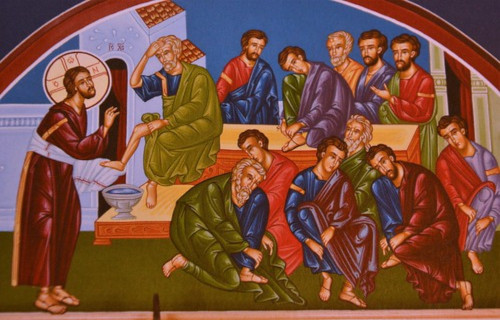
A novice reflects on the readings for the 19th Sunday in Ordinary Time (Year C)
Today’s Gospel starts with a well-known juxtaposition: treasure on earth versus treasures in heaven. To understand this exhortation of the Lord to work for heavenly treasure while relinquishing earthly ones is to look at the sentence Christ says immediately preceding it, “Do not be afraid little flock, for it is your Father’s good pleasure to give you the kingdom.” The calling to a spirit of poverty would not make sense without hope and faith in a kingdom which we do not see as well as in the unfailing providence of God. In other words, a spirit of poverty is a spirit of trust in the promises of God.
Jesus then calls his “little flock” to become “good slaves”. While it is not wrong to see ourselves as slaves of God due to the greatness of God compared to us, there is something incredibly strange in Christ saying that “he will have them sit down to eat, and he will come and serve them.” This points to the events of the last supper where Christ the Lord and master of the apostles washes their feet and serves them, He says “I do not call you slaves any longer… but I have called you friends.” Fittingly, after declaring those who are rightly slaves to be His friends, He would die for them and so reconcile them to Himself, that we can become friends by learning to serve. St. Paul states that “having been set free from sin you have become slaves of righteousness. For the wages of sin is death, but the free gift of God is eternal life in Christ Jesus.” Death was our just wage for sin, but eternal life is a gift. We are slaves in that we deserve no wage, but friends in that God gives us His own life as a gift.
Our faith sees that God knows all and is true to His word. In suffering, afflictions and trials we may blame God as unjust/ evil, or distant and unknowing, perhaps as incapable of punishing sin because he will forgive everything anyway. For St. Bernard grave sin arises from a disbelief in God’s justice, goodness or power. The slave beating his fellow slaves and getting drunk could reflect our own tendencies towards the presumption, despair or short-sightedness by which we excuse our sins. “Obedience of faith” comes from faith in God, revealed in Christ, who cares for us individually, and is perfectly just in His judgements. This is a call not to panic but to cling to the cross of Christ in which we are reconciled and justified so that sin has no power over us anymore. Promising to come again to judge as He does in the parables today, Christ reveals that He takes an interest in our whole life since His judgements are truly just. Now our sufferings have become a source of hope instead. By faith and hope in providence we can persevere and follow Christ’s call to set our heart on the treasures in heaven, to worldly things. We can fearlessly live a spirit of poverty because God will provide. The second reading presents the faith of Abraham. His actions stem from his “looking forward to the country,” his faith is the source of his righteousness. The Christian faith is a fulfillment of the promises of God who was faithful to His promises revealing his providence, hence Mary sings in the Magnificat: “remembering his mercy, the mercy promised to our fathers, to Abraham and his children forever.”
Our faith is in “Jesus Christ, and Christ crucified who has become for us our wisdom and righteousness and sanctification and redemption;” in “God who raised Christ from the dead” and can raise us in Christ because He wants to give us the kingdom. St. Thomas Aquinas insists that the grace of God is truly sanctifying and faith is a real participation in the habitual grace of the human Christ who is the source of all graces and virtues. To be a watchful slave is to partake faithfully in the life of Christ who became a slave for us; to imitate His death, bearing with His own enduring obedience all trials in hope that “the Son of Man is coming.” St. Augustine writes that “there is no happy life apart from the perfect knowledge of God.” The perfect knowledge of God is the beatitude and purse which we hope for in heaven when we see Christ in glory. We live by faith: “the assurance of things hoped for”; the same faith Abraham had which was reckoned as righteousness; the faith of the Psalmist as he sings “rejoice in the Lord, O you righteous. Praise befits the upright.” Rightly we praise God in faith today and we hope to praise Him with the saint in heaven.
